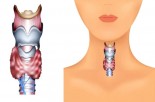What Is the Thyroid Gland?
The thyroid gland is located below the Adam’s apple on your neck, and if it’s normal sized, you won’t be able to feel it. Its main function is to control and maintain your metabolism, but it affects so much more. Your energy level, heart rate, sense of wellbeing, hair growth, weight, and even your mood are all affected by the thyroid, so it’s important to make sure it’s in working order.
There are two types of thyroid disorders: hypothyroidism, and hyperthyroidism. The hypo prefix indicates an underactive thyroid. Symptoms can typically include lethargy, tiredness, lack of motivation, low response, hair loss, and weight gain. Hyperthyroidism has the opposite effect on your body, and often causes palpitations, jitteriness, hyperactivity, rapid weight loss, and shortness of breath.
Theodore Friedman, MD, PhD, is a Professor of Medicine at the David Geffen School of Medicine at UCLA, where he also serves as Vice-Chairman of the Department of Internal Medicine. Dr. Friedman’s work focuses on increasing knowledge and improving overall patient care in metabolism and endocrinology. According to Dr. Friedman, hypothyroidism is the most common diagnosis in patients, by as much as a 10 to 1 ratio.
Recognizing Thyroid Disease
Hypothyroidism is usually caused by an autoimmune attack on the thyroid gland by your body’s antibodies, and it’s also called Hashimoto’s thyroiditis or Hashimoto’s disease. Since most people who have hypothyroidism due to Hashimoto’s disease, it’s crucial to measure the Hashimoto antibody. Even though around 25 million Americans have thyroid disease, an estimated 50 percent do not realize it and remain undiagnosed. Dr. Friedman strongly encourages you speak to your doctor and get properly tested for hypothyroidism.
An article from the Huffington Post highlights 10 additional things you really need to know about your thyroid:
- Having the right amount of thyroid hormone for your individual needs is essential to your well-being.
- Women are more likely than men to develop thyroid problems, and the months following birth pose an especially high risk for thyroid problems to surface.
- Most doctors actually under-diagnose thyroid problems.
- An under-active thyroid could actually be causing your high cholesterol.
- Hypothyroidism can be causing your fertility problems, and also increases the risk of miscarriage.
- Optimal thyroid functioning is also essential for the healthy development of your baby’s brain.
- If you are having a tough time losing weight, tuning up your thyroid gland will boost your metabolism and burn calories without you doing extra work.
- Thyroid glands need nourishment.
- Fluoride, bromide, and chloride coming from your diet, fluoridated water, toothpaste, or other environmental exposures, can interfere with the iodine your thyroid needs to function properly.
- In gluten-sensitive individuals, eating gluten-containing foods (such as wheat, barley, rye) and possibly even some of the gluten cross-reactive foods may cause Hashimoto’s disease.
Some cases of depression can be caused by hypothyroidism, and being tested can help rule it out. If your thyroid disorder has caused weight issues, Dr. Friedman believes it’s vital to begin a proper diet and exercise routine. Even though you may have gained the weight due to hypothyroidism, not changing to a healthier lifestyle and continuing to eat badly will cause you to remain overweight long after the hypothyroidism has been treated.
In this segment, Theodore C. Friedman, MD, PhD, shares why having your thyroid checked is so important, and the top 10 things you need to know about your thyroid.




 Theodore C. Friedman, M.D., Ph.D., contributes to public health through many different avenues. From his role in direct patient care, to his many research contributions in peer-reviewed endocrinology journals, to his efforts in educating the lay public, Dr. Friedman's work aims to increase knowledge and improve overall patient care in areas of endocrinology and metabolism.
Theodore C. Friedman, M.D., Ph.D., contributes to public health through many different avenues. From his role in direct patient care, to his many research contributions in peer-reviewed endocrinology journals, to his efforts in educating the lay public, Dr. Friedman's work aims to increase knowledge and improve overall patient care in areas of endocrinology and metabolism.